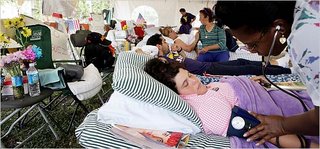
A New York Times article on the hunger strikers at the University of Miami is titled "Anger Rises on Both Sides of Strike at University of Miami". One side consists of people who are not eating, the other side consists of university officers who don't want to force a subcontractor to let the janitors join a union:
Outside the University of Miami's main entrance, six janitors and five students continued their hunger strike on Monday, with several asserting that the university's president, Donna Shalala, was a union-buster.
The janitors have been on a hunger strike for 13 days, the students for 6 — all part of a labor dispute that has turned unusually personal, with faculty members, students, union leaders and members of the clergy sharply criticizing Dr. Shalala.
Day after day, the janitors and their supporters heap invective on Dr. Shalala, who was President Bill Clinton's secretary for health and human services, saying she has not done enough to pressure the university's cleaning contractor to grant union recognition.
And day after day the hunger strikers grow weaker as they lie in tents set up in a protest zone they call Freedom Village.
"If you think of Donna Shalala's history, she has this persona of being an advocate for poor, marginalized people in this country," said Frank Corbishley, the university's Episcopal chaplain. "In this dispute she's clearly been an enemy of the working poor."
The supporters of unionization have rarely missed an opportunity to contrast Dr. Shalala's life with those of the janitors. Most make less than $17,000 a year, while she earns $516,904 a year, lives in the university's 9,000-square-foot presidential residence, and has a 29-foot motorboat and a dog, Sweetie, that has four dog beds.
Dr. Shalala dislikes the invective and the tactics used by the Service Employees International Union, which is seeking to unionize the university's 425 janitors, who work for a subcontractor, the Unicco Service Company. She said she was especially angry that a pro-union sit-in had prevented students from getting to class and that demonstrators had disrupted her Health Politics class.
"I've been in public life for a lot of years," Dr. Shalala said, "and I'm used to people being in my face and saying ugly things. I don't take it personally."
It's preposterous to equate the anger and frustration of the two sides.
Unions get a lot of bad press in this country and some of it is deserved. But without the ability to unionize workers are tiny fishes floating around in the big sea of the marketplace, trying to negotiate with gigantic shark corporations (which shouldn't exist if the antitrust laws worked like they were intended to). John Galbraith saw unions as the counterveiling power for big corporations. Add that to the enormous and legal hurdles facing anyone trying to unionize a workforce and what do you conclude? Not balance, that's for sure.